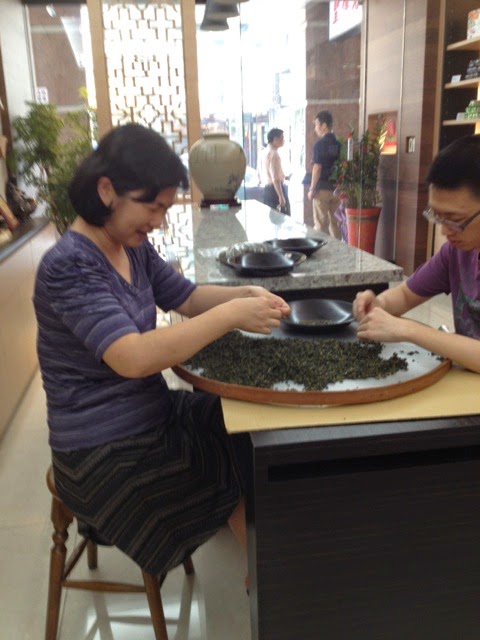Greetings from Taiwan!
Today (day two in Taiwan) I woke up and still had jet lag. While I had tea with my friend, she told me she didn't have to work today and asked me what I wanted to do. My mind was thinking about all of the work I should be doing today, but I looked out and it was sunny and beautiful. I looked at her and thought, "What the heck. I should enjoy today off with her!" I told her we should go to PingLin to enjoy the view and sunshine.
The moment we set out from her house, we were already filled with joy. The breeze and sunshine brought smiles to our faces (70F, awesome!!!).
Before we headed out, I called a tea friend to let him know that I had already arrived in Taiwan. He told me he was planning to be in PingLin to pick up some tea for me. What a nice coincidence!
We met in Farmer Chen's shop and had some tea. It was great to see Mrs. Chen. She greeted us with a big smile. She said Farmer Chen was out picking tea today. The weather conditions were good to make Dong Pian, the second winter harvest tea.
Mrs. Chen heated up the water and treated us to a pot of the most freshly made Dong Pian Baozhong. It was very fragrant. She said Dong Pian Baozhong is from JinXuan, Cui Yu, and SiJiChun varietals. She said Chin Xin varietal doesn't grow very quickly after the first winter harvest. The tea we were drinking was made from Cui Yu, so it’s no wonder the bouquet was very bold.
After tea, we went to have lunch. Ah food, so good! While we were eating, Mr. Tsai's wife told us about some special dishes from her hometown, and invited us to go there to eat! I told her that only Taiwanese people will talk about other food while they are already eating a lot of food. I always find these moments to be adorable and I truly savor them.
After lunch, we went to look for Farmer Chen. I went to one of his tea fields and didn't find him. On the way there, we saw lots of beautiful tea flowers. Mr. Tsai said that they are getting popular in Taiwan, so lots of people are growing them.
It was beautiful in PingLin today. I took in as much as I could and feel very lucky to be here with my dear friends. A view, a smell, the sound of birds and insects, and friends remind me how much I love this special island.
We didn't end up finding Farmer Chen, but it's alright. I can imagine his smile and I keep it in my heart while we continue our trip in PingLin.
















































.JPG)


